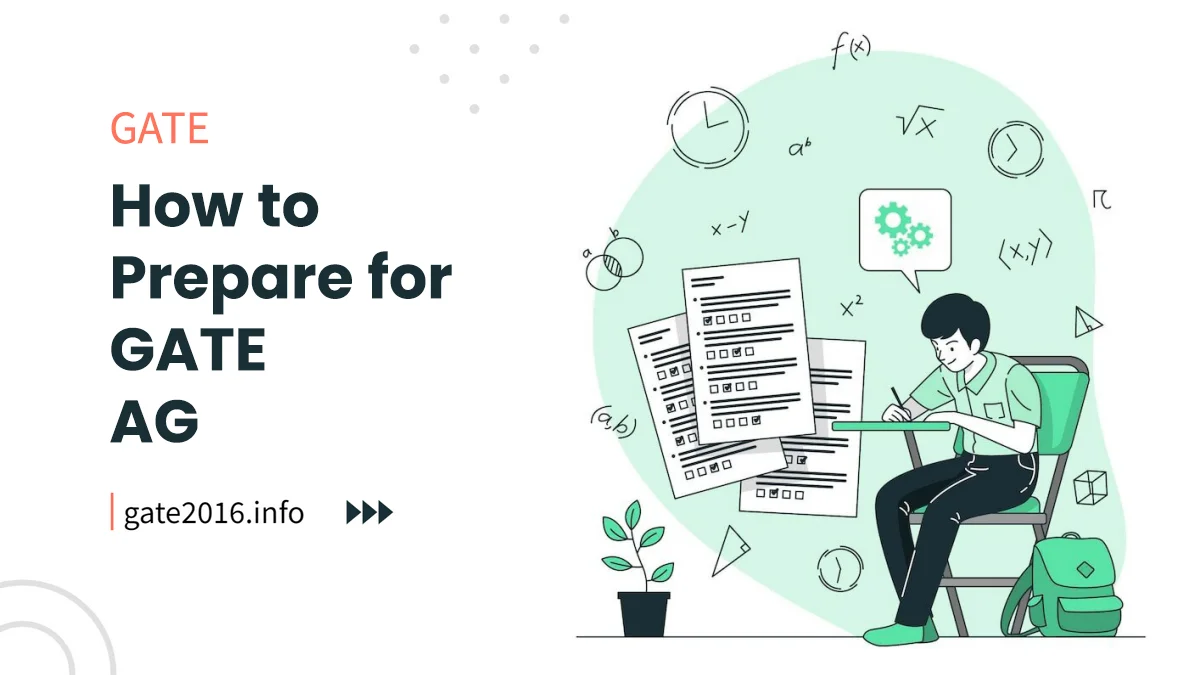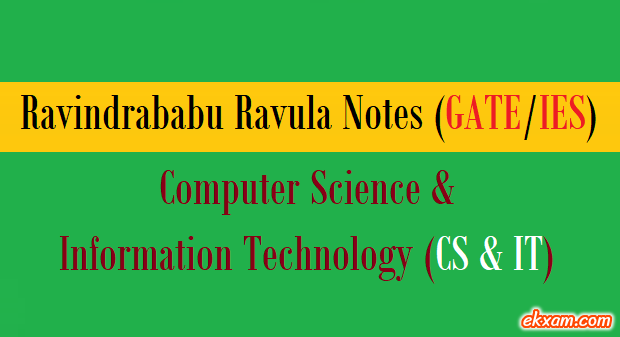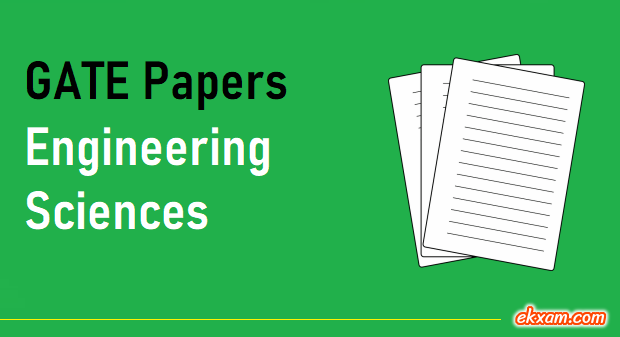Advertisements
Ratings

GATE 2024 AE Preparation – Preparing for the Graduate Aptitude Test in Engineering (GATE) in Agricultural Engineering is a challenging yet rewarding journey.
This comprehensive guide outlines a step-by-step plan to help aspiring candidates navigate through the GATE Agricultural Engineering examination with confidence.
Contents
- 1. Introduction to GATE Agricultural Engineering
- 2. Understanding the GATE Agricultural Engineering Syllabus
- 3. Creating a Structured Study Plan
- 4. Choosing the Right Study Materials
- 5. Mastering Core Concepts
- 6. Solving Numerical Problems
- 7. Reviewing Previous Years’ Question Papers
- 8. Taking Mock Tests
- 9. Effective Time Management
- 10. Revision Techniques
- 11. Staying Updated with Agricultural Engineering Trends
- 12. Managing Exam Stress
- 13. Final Weeks’ Preparation Strategy
- 14. Approaching Exam Day with Confidence
- 15. Reflecting on the Exam and Planning Ahead
- Conclusion: Navigating GATE Agricultural Engineering
- Additional Resources and References
- GATE Agricultural Engineering Guidance
- GATE Agricultural Engineering Preparation FAQs
- GATE Total Information & Guidance
1. Introduction to GATE Agricultural Engineering
The GATE examination serves as a gateway to prestigious postgraduate programs and career opportunities.
Effective preparation is key to excelling in the GATE Agricultural Engineering exam.
2. Understanding the GATE Agricultural Engineering Syllabus
The GATE Agricultural Engineering syllabus covers a wide range of topics, ensuring a holistic understanding of the field.
Let’s break down the syllabus into its core subjects and key topics:
Table 1: GATE Agricultural Engineering Syllabus Breakdown
| Subject | Key Topics |
|---|---|
| Engineering Mathematics | Linear algebra, Calculus, Differential equations, Probability and statistics |
| Farm Machinery and Power | Machine design, Soil dynamics, Tractor systems |
| Soil and Water Conservation Engineering | Erosion and sediment control, Irrigation systems |
| Agricultural Processing Engineering | Post-harvest technology, Food processing |
| Agricultural Structures and Environmental Control | Greenhouses, Ventilation, Structures |
| Renewable Energy Sources | Bioenergy, Solar and wind energy |
3. Creating a Structured Study Plan
Developing a structured study plan is the foundation of successful GATE Agricultural Engineering preparation.
Follow this template to create your personalized plan:
Table 2: Sample Study Plan
| Week | Subjects/Topics | Time Allocation |
|---|---|---|
| 1-2 | Engineering Mathematics | 10 hours/week |
| 3-4 | Farm Machinery and Power | 12 hours/week |
| 5-6 | Soil and Water Conservation Engineering | 15 hours/week |
| 7-8 | Agricultural Processing Engineering | 10 hours/week |
| 9-10 | Agricultural Structures and Environmental Control | 12 hours/week |
| 11-12 | Renewable Energy Sources | 8 hours/week |
4. Choosing the Right Study Materials
Selecting the appropriate study materials is vital for comprehensive preparation.
Utilize a mix of textbooks, reference books, online courses, and mock tests for each subject:
Table 3: Recommended Study Resources
| Subject | Books | Online Courses |
|---|---|---|
| Engineering Mathematics | “Advanced Engineering Mathematics” by Erwin Kreyszig | Khan Academy, Coursera Mathematics courses |
| Farm Machinery and Power | “Farm Machinery” by R.L. Arya, “Principles of Agricultural Engineering” by A.M. Michael | NPTEL’s Farm Machinery and Power course |
| Soil and Water Conservation Engineering | “Soil and Water Conservation Engineering” by R.S. Yadav | Coursera’s Soil and Water Management course |
| Agricultural Processing Engineering | “Postharvest Technology and Processing of Horticultural Crops” by Adel Kader | NPTEL’s Food Process Engineering course |
| Agricultural Structures and Environmental Control | “Agricultural Structures” by H. Alan Stine, “Design of Structures and Foundations for Vibrating Machines” by G. Ramamurthy | NPTEL’s Environmental Control in Greenhouses course |
| Renewable Energy Sources | “Renewable Energy” by Godfrey Boyle | NPTEL’s Renewable Energy course |
5. Mastering Core Concepts
Understanding the core concepts in agricultural engineering is essential for GATE preparation.
Here’s a breakdown of key topics within core subjects:
Table 4: Mastering Core Concepts
| Subject | Key Concepts |
|---|---|
| Farm Machinery and Power | Machine design principles, Tractor systems, Soil dynamics |
| Soil and Water Conservation Engineering | Erosion control techniques, Irrigation methods |
| Agricultural Processing Engineering | Post-harvest technology, Food preservation |
| Agricultural Structures and Environmental Control | Design of agricultural structures, Greenhouse ventilation |
| Renewable Energy Sources | Bioenergy production, Solar and wind energy technologies |
6. Solving Numerical Problems
Numerical problem-solving is a critical aspect of the GATE Agricultural Engineering exam.
Practice solving a variety of numerical problems to enhance your problem-solving skills:
Table 5: Enhancing Problem-Solving Skills
| Concept/Topic | Problem-Solving Practice |
|---|---|
| Farm Machinery and Power | Calculations related to machine design, Tractor performance |
| Soil and Water Conservation Engineering | Quantitative analysis of erosion and sediment control |
| Agricultural Processing Engineering | Calculations in food processing and preservation |
| Agricultural Structures and Environmental Control | Ventilation system design, Structural calculations |
| Renewable Energy Sources | Energy production calculations, Renewable energy feasibility |
7. Reviewing Previous Years’ Question Papers
Solving previous years’ question papers is a valuable preparation strategy.
It helps you familiarize yourself with the question patterns and difficulty levels:
Table 6: Benefits of Solving Previous Years’ Papers
| Benefit | Description |
|---|---|
| Understand Question Types | Identify common question patterns and formats |
| Time Management | Practice completing the paper within time |
| Exam Pattern Familiarity | Get comfortable with GATE question patterns |
| Self-Assessment | Evaluate your preparation level and progress |
8. Taking Mock Tests
Taking mock tests under simulated exam conditions is crucial for building confidence and improving time management:
Table 7: Benefits of Taking Mock Tests
| Benefit | Description |
|---|---|
| Exam Simulation | Replicate the actual exam environment |
| Time Management Improvement | Practice allocating time to different sections |
| Confidence Building | Boost your confidence before the actual exam |
| Identifying Weak Areas | Identify areas needing further improvement |
9. Effective Time Management
Managing time during the exam is essential for attempting all questions.
Develop a time management strategy to allocate time to different sections based on their weightage:
Table 8: Time Management Strategy
| Section | Recommended Time Allocation |
|---|---|
| Engineering Mathematics | 15 minutes |
| Subject-specific Sections | 75 minutes each |
10. Revision Techniques
Regular revision is vital for retaining information. Use structured revision techniques to reinforce your knowledge:
- Develop a Revision Schedule: Allocate time for revisiting key topics and concepts regularly.
- Create Concise Notes: Condense important information into easy-to-review notes and flashcards.
11. Staying Updated with Agricultural Engineering Trends
Keeping up with the latest trends and advancements in agricultural engineering is essential:
- Follow Reputable Sources: Subscribe to academic journals, industry magazines, and research publications.
- Engage in Online Communities: Participate in forums and communities to discuss recent developments.
12. Managing Exam Stress
Effective stress management is crucial for maintaining focus and composure during preparation:
- Practice Relaxation Techniques: Engage in mindfulness, meditation, and deep breathing exercises.
- Balanced Routine: Maintain a balanced routine with study time, breaks, exercise, and relaxation.
13. Final Weeks’ Preparation Strategy
As the exam date approaches, focus on targeted revision and improving weak areas:
- Intensive Revision: Dedicate more time to challenging topics and subjects.
- Solve Mock Tests: Practice additional mock tests to simulate the exam environment.
14. Approaching Exam Day with Confidence
On the day of the exam, stay calm and follow these strategies:
- Read Instructions Carefully: Understand the question paper pattern and instructions.
- Manage Time Effectively: Allocate time wisely to different sections based on their importance.
15. Reflecting on the Exam and Planning Ahead
After the exam, assess your performance and plan your next steps:
- Evaluate Performance: Analyze how you performed in different sections and topics.
- Identify Areas for Improvement: Recognize strengths and areas that need further enhancement.
Preparing for GATE Agricultural Engineering requires dedication, planning, and perseverance.
By following this comprehensive guide, you’ll be well-equipped to excel in the examination and unlock opportunities in the field of agricultural engineering.
Additional Resources and References
For additional resources and references, explore the recommended textbooks, online courses, and practice papers mentioned in this guide.
These resources will further enhance your understanding and preparation for the GATE Agricultural Engineering exam.
GATE Agricultural Engineering Guidance
- How to Prepare for GATE Agricultural Engineering: A Comprehensive Guide
- GATE 2025 Books: Agricultural Engineering
- GATE AG Syllabus 2025: Agricultural Engineering
- GATE AG Previous Year Solved Papers – (2023-2007)
GATE Agricultural Engineering Preparation FAQs
What is GATE Agricultural Engineering (AG)?
GATE AG is an examination conducted by the Indian Institute of Technology (IIT) for admission into postgraduate programs in Agricultural Engineering and related fields.
It evaluates candidates' knowledge and understanding of agricultural concepts and serves as a gateway to higher education in this specialized field.
What are the important subjects to focus on for GATE Agricultural Engineering preparation?
Key subjects to focus on include soil and water conservation, irrigation, farm machinery and power, agricultural processing, post-harvest technology, and agricultural economics.
Ensure you refer to the official GATE syllabus for Agricultural Engineering for a comprehensive understanding of the topics.
How should I prepare for the GATE AG exam?
Effective preparation involves creating a study plan based on the GATE syllabus. Use standard textbooks, reference materials, and online resources for each subject.
Solving previous years' question papers and mock tests is crucial for gaining familiarity with the exam pattern and refining your problem-solving skills.
Are there any recommended books or resources for GATE Agricultural Engineering preparation?
Yes, some recommended books and resources include:
- 'Fundamentals of Farm Machinery and Power' by Dr. Jagdish Singh
- 'Soil and Water Conservation Engineering' by Glenn O. Schwab
- 'Agricultural Processing and By-Product Utilization' by Goyal and Gupta
- 'Agricultural Economics' by S. Subba Reddy
- Online courses and lecture videos from reputable institutions and platforms like NPTEL.
What is the exam pattern for GATE Agricultural Engineering, and how should I approach it?
GATE AG typically consists of multiple-choice questions, multiple-select questions, and numerical answer type questions.
The questions cover various aspects of agricultural engineering, including theory and practical applications.
Start by tackling questions you are confident about and manage your time effectively. Don't hesitate to skip challenging questions and return to them later.
Accuracy and a strong grasp of fundamental concepts are essential for performing well in the exam.
Recent Posts
- AAI Through GATE 2024 – JE (Junior Executive)
- M Tech and MS Programs Through GATE and GRE: Navigating Postgraduate Options
- Job Opportunities After GATE 2024 in India: What You Didn’t Know!
- BSPHCL Through GATE 2024 – 40 AEE
Related Tags
How to prepare for gate agricultural engineering pdf 2024, gate agricultural engineering syllabus 2024 , gate agricultural engineering syllabus pdf 2024, gate agricultural engineering books pdf free download 2024, gate agricultural engineering question papers 2024, gate agricultural engineering study material pdf 2024, gate agricultural engineering syllabus pdf 2024, gate agricultural engineering question paper 2024
| GATE (Reasoning & Aptitude & Maths) Books |
| GATE Guide Books |
GATE Total Information & Guidance
Click below given links to get further information.






